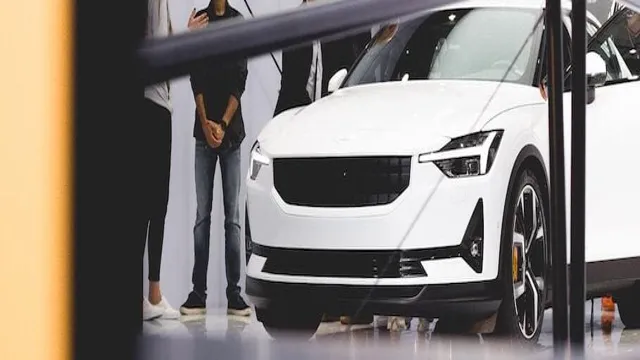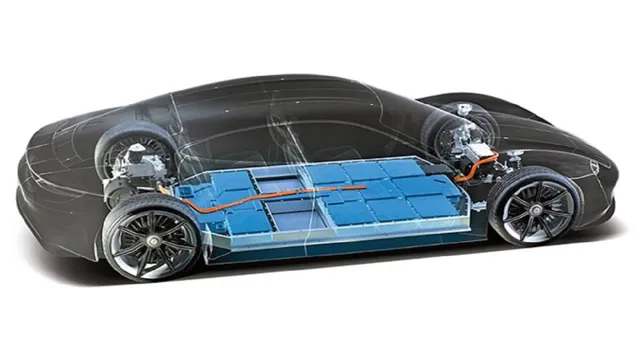Why Cold Weather is a Challenge for Electric Car Batteries: Debunking the Myths and Facts
As the popularity of electric cars continues to grow, so does the concern about how they perform in colder climates. One of the main factors affecting electric car performance in cold weather is the battery. Batteries are the heart of electric vehicles, and they rely on chemical reactions to produce the energy needed to power the car.
When the temperature drops, the chemical reactions slow down, leading to reduced battery performance. This can result in shorter driving ranges, longer charging times, and even complete battery failure. So, what can electric car owners do to prepare their batteries for cold weather? Let’s dive into the world of electric car batteries and explore some tips to keep them performing in even the coldest of temperatures.
Introduction: Understanding Electric Car Battery Chemistry
One of the main concerns people have with electric cars is how their batteries hold up in cold weather. The answer is yes, electric car batteries do suffer in the cold. But it’s not just the cold temperatures themselves that cause this.
Rather, it’s the chemical reactions happening inside the battery that are affected by the cold. Every battery chemistry is different, but generally, colder temperatures slow down the electrochemical reactions that happen inside the battery. This can lead to a decrease in voltage and overall output, shortening the distance an electric car can travel on a single charge.
However, some electric car manufacturers have developed ways to mitigate these issues, such as adding thermal management systems that keep the battery at an optimal temperature, even in extreme weather conditions. So, while the cold weather can impact the range of electric cars, it’s not a dealbreaker and shouldn’t deter anyone from making the switch to electric.
How Do Electric Car Batteries Work?
Electric car batteries work a bit differently than traditional car batteries, and it all comes down to the chemistry involved. Most electric car batteries utilize lithium-ion technology, which is favored for its high energy density and long cycle life. In simple terms, the battery consists of two main components: an anode and a cathode.
When the battery is charged, lithium ions flow from the cathode, through an electrolyte, and into the anode. When the car is in use, the process reverses, and the lithium ions flow from the anode back to the cathode, creating an electrical current in the process. Think of it like a bank account, with charging deposits and usage withdrawals being made over time.
While there are still challenges to overcome with electric vehicle batteries, the technology has come a long way and is continually improving.

Factors Affecting Battery Performance
Electric car battery technology has come a long way in recent years, and with it, new factors affecting battery performance have come to light. Understanding electric car battery chemistry is key to maximizing the performance of your electric vehicle. A battery is essentially a chemical reaction that happens inside a sealed container.
Each battery chemistry has its own unique set of characteristics, which in turn affects the performance of your electric vehicle. Lithium-ion batteries, which are currently the most widely used in electric cars, are known for their high energy density, making them ideal for use in EVs. However, they are also highly sensitive to temperature changes, which can impact their overall performance and lifespan.
It’s also important to consider factors such as battery age, usage patterns, and charging habits when evaluating battery performance. By understanding the chemistry behind electric car batteries and taking steps to optimize their performance, you can ensure that your electric vehicle remains reliable and efficient for years to come.
Battery Performance in Cold Weather
When it comes to electric cars, the question on many people’s minds is, do electric car batteries suffer in the cold? The answer is yes, they do. Just like any battery, electric car batteries perform differently depending on the temperature. In fact, cold weather can have a significant impact on an electric car’s battery performance.
The reason for this is that low temperatures slow down the chemical reactions in the battery, reducing its efficiency. This means that electric car owners may experience a decrease in range, slower acceleration, and longer charging times during the winter months. However, there are ways to mitigate this issue.
For example, preheating the car before driving can help warm up the battery, increasing its efficiency. Additionally, parking in a garage or enclosed space can help to keep the car’s battery warmer, thus improving performance.
The Effects of Temperature on Battery Performance
When temperatures begin to drop, battery performance can also be affected, leading to shorter battery life and reduced power output. This is especially true for lithium-ion batteries, which are commonly used in electronic devices. When these batteries are exposed to cold temperatures, their chemical reactions slow down, reducing their ability to provide energy.
In some cases, this can even cause the battery to stop functioning completely. For this reason, it’s important to keep your electronic devices at room temperature whenever possible, especially during the winter months. It’s also a good idea to carry a spare battery with you if you’ll be using your device in cold weather for an extended period of time.
By taking these precautions, you can ensure that your battery performs optimally no matter what the temperature is outside.
Cold Weather’s Impact on Battery Range
The colder months can definitely impact your electric vehicle’s battery performance, causing a decrease in range. In fact, batteries can lose up to 40% of their capacity in extremely cold conditions, which can be frustrating for drivers who rely on their vehicles. This is because the chemical reactions that occur within the battery slow down in colder temperatures, causing the battery to have less power.
To help mitigate this issue, it is recommended to keep your car in a garage or covered area, use a preheating system, and limit the use of battery-draining features like heated seats and steering wheels. Additionally, keeping your battery charged up to at least 50% can help maintain its capacity during the winter months. It’s important to note that although cold weather can impact your battery range, the reduction in range is temporary and will improve as the battery warms up.
With a little extra care and attention, you can help ensure your electric vehicle’s battery performs optimally even in the coldest conditions.
Common Myths About Electric Cars and Cold Temperatures
Electric car battery performance in cold weather is often misunderstood. One common myth is that electric cars have zero range in cold temperatures. This is not entirely true.
While it’s true that batteries are negatively affected by cold weather, resulting in a reduction in overall range, modern electric cars are equipped with advanced thermal management systems that help mitigate the effects of cold weather on battery performance. In fact, electric cars can still perform well in very cold temperatures, provided that they are charged to a sufficient level and are equipped with features like regenerative braking that help extend their range. Additionally, some electric vehicle models are designed specifically for cold weather driving and come equipped with winter packages that include features like battery pre-heating, which can help improve battery performance in cold temperatures.
All things considered, it’s important to understand that while extreme cold can affect electric car battery performance, it’s not a deal breaker and doesn’t render electric cars useless in colder climates.
Tips to Optimize Battery Performance in the Cold
Yes, electric car batteries do suffer in the cold, but there are ways to optimize their performance. One important tip is to preheat the battery while the car is plugged in, so it starts with a warmer temperature. This can be done through the car’s app or setting a timer for the heating to occur before you plan on driving.
Additionally, it’s important to limit the use of the car’s heater and other energy-consuming features during cold weather, as this can drain the battery faster. Maintaining proper tire pressure and keeping the car parked in a garage or covered area can also help preserve the battery’s overall performance. By being mindful of these tips, electric car drivers can enjoy improved battery life even in chilly temperatures.
Preheating Your Battery and Cabin
Preheating your battery and cabin is essential to optimize battery performance in cold weather. When the temperature drops, it impacts your vehicle’s battery and reduces its efficiency. This is why it is crucial to preheat the battery and cabin before taking off.
Preheating the battery warms up the electrolyte in the battery, which improves its performance and increases its lifespan. It also reduces strain on the battery, making it less likely to fail in cold weather. Preheating the cabin not only makes your ride more comfortable but also reduces the need to use the heater, which drains the battery.
Use a block heater or battery warmers to preheat the battery and plug in your vehicle to an electric source. You can also use a remote starter to warm up the cabin before you leave, ensuring a comfortable and energy-efficient drive. Keep your battery healthy and maximize your vehicle’s performance by preheating your battery and cabin.
Minimizing Use of In-Car Tech
“Tips to Optimize Battery Performance in the Cold” Winter weather can be a real drain on your car’s battery, with the cold temperatures sapping its power and potentially leaving you stranded. But there are a few things you can do to optimize your battery’s performance and ensure you don’t end up in a tough spot. One key tip is to minimize your use of in-car tech, such as heated seats or a stereo system, which can drain your battery more quickly.
Instead, consider bundling up with extra layers or investing in a heated blanket to keep warm. It’s also important to make sure your battery is in good condition before winter hits, with no cracks or leaks, as these can make it more susceptible to being drained by the cold. Lastly, if you’re not driving your car regularly, consider investing in a trickle charger to keep the battery charged and prevent it from fully draining.
By following these tips, you can help ensure your car’s battery stays strong and reliable throughout the colder months.
Conclusion
In conclusion, do electric car batteries suffer in the cold? The answer is yes, but don’t we all? Just like how our phones and laptops struggle in frigid temperatures, electric car batteries face similar challenges. However, with advancements in technology and proper maintenance, electric vehicles can withstand the cold just as well as their gas-powered counterparts. So next time winter hits, don’t let the cold scare you away from driving green.
Just make sure to bundle up your car with a good battery blanket and it’ll be ready for a cozy, emissions-free ride.”
FAQs
How does cold weather affect the range of electric car batteries?
Cold weather can reduce the range of electric car batteries by up to 40% due to the increased resistance within the battery itself.
Is it more expensive to maintain an electric car battery during the winter months?
Yes, it can be more expensive to maintain an electric car battery during the winter months as the battery consumes more energy trying to maintain its temperature.
Are there any tips for maximizing electric car battery life during colder weather?
Yes, to maximize electric car battery life during colder weather, it is recommended to plug the car in whenever possible to keep the battery warm, and limit use of power hungry features such as seat warmers and heaters.
Can extreme cold weather damage an electric car battery permanently?
Yes, extreme cold weather can cause permanent damage to an electric car battery by reducing its overall capacity and lifespan. It is important to take extra care when driving and charging your electric car during cold weather conditions.



